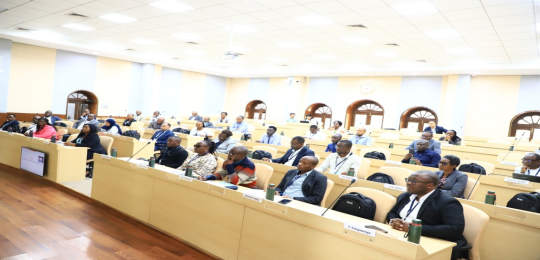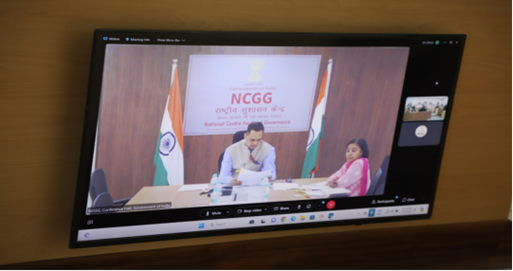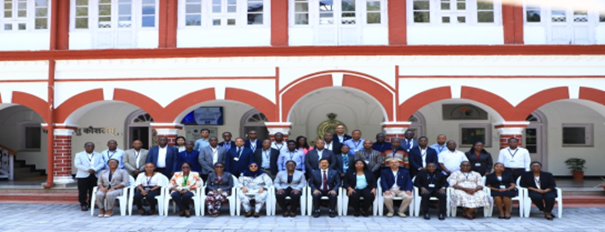39 senior officers from various key ministries and departments are attending the program
“Progressive policies and digital governance is the mantra for development and empowerment of citizens” says DG, NCGG
The two weeks program on Capacity Building Programme on Project and Risk Management for Public Works for the officers from Republic of Tanzania commenced today at the National Centre for Good Governance (NCGG), Mussoorie. The program is being organized from 6th May, 2024 to 17th May, 2024 in partnership with the Ministry of External Affairs (MEA) Government of India. A total of 39 officers representing various organisations and ministries in Tanzania such as National Roads Agency, Ministry of Energy, Planning Commission, Tanzania Building Agency, Tanzania Railway Corporation, Housing investments, Rapid Transit Agency, E-government authority, Energy and Water Regulatory Authority, President’s Office Public Service Management and Good Governance, Regional Administration and Local Government, Livestock and Fisheries among others are attending the programme.

The NCGG, an autonomous institution under the Department of Administrative Reforms and Public Grievances, Ministry of Personnel, Public Grievances and Pensions, Government of India, is committed to action research, studies, and capacity building at both the national and international levels. NCGG’s efforts align with the Indian philosophy of ‘Vasudhaiva Kutumbakam’ i.e. “The world is one Family” and emphasizes strengthening bilateral ties and fostering cooperation with other countries. The capacity building program focuses on providing a rich cross country experience and a platform for policy dialogue, while sharing best practices focusing on project and risk management in various sectors. This will result in the officers gaining valuable insights into the manner in which projects are planned and executed and institutions are being transformed and people are getting closer to the government.
Shri V. Srinivas, Director General, National Centre for Good Governance (NCGG) and Secretary, Department of Administration Reform and Public Grievances (DARPG) in his inaugural address extended a warm welcome to the participating officers. During his address, he talked about the relations between the two nations and the outline of future collaborations in the area of capacity building programmes. He focused on the evolving landscape of governance and gave an elaborate presentation on the New Paradigms of Governance and emphasized on the transformative role of technology in maximizing governance efficiency and development thereby bringing citizens closer to government. He elaborated on National E- Service Delivery Assessment, India’s vision for 2047 and showcased exemplary governance models such as Aadhaar Card, Advancements in Fintech, Public Grievance Redressal Mechanisms like CPGRAMS, and the integration of Artificial Intelligence in administration.

Shri V. Srinivas, Director General, National Centre for Good Governance (NCGG) and Secretary, Department of Administration Reform and Public Grievances (DARPG)
Speaking on the occasion Mr. George Nsavike Ndatta, Head of the Delegation expressed gratitude to the Indian Government for extending such a warm hospitality and providing this immensely useful opportunity to facilitate knowledge exchange. He was of view that this will ultimately empower officers to implement and design effective projects thereby aiding development in the country.
Dr. B.S Bisht, Associate Professor and Course Coordinator gave a comprehensive presentation on the background and ongoing initiatives of the National Centre for Good Governance. He also highlighted the core objectives of the two-week training program, which is meticulously structured to equip officers with essential skills in Project and Risk Management for Public Works, while showcasing several projects and works in several important sectors relevant to the participants. He elaborated how the programme is designed for officers who are at decision making level and is aimed at equipping them with the cutting-edge knowledge, skills and tools to deliver and design effective public works projects, which will lead to achievement of good governance and ultimately sustainable development apart from providing a rich cross-country experience so that there is no need to reinvent the wheel.
He discussed how the programme covers a diverse range of topics such as Project Selection and Formulation, Project Management Framework and Processes, Project Risk Management, PPP in Infrastructure Projects, Smart and Resilient Cities, Innovation in Awarding Public Projects, and Managing Rural and Urban Housing Projects. Additionally, the program incorporates immersive field visits, with officers slated to visit key project sites such as Dakpathar Hydropower and Irrigation Dam, NHAI in Uttarakhand, Dwarka Expressway in New Delhi, Indira Paryavaran Bhawan, World Trade Centre NBCC in New Delhi, and the Delhi Metro Rail Corporation, culminating with a visit to the iconic Taj Mahal. He also informed that in partnership with MEA, NCGG has imparted training to civil servants of 17 countries.

The entire capacity building programme will be supervised by Dr. B.S Bisht, Associate Professor and Course Coordinator, Dr. Sanjeev Sharma, Associate Course Coordinator and Shri Brijesh Bisht, Training Assistant, NCGG.


